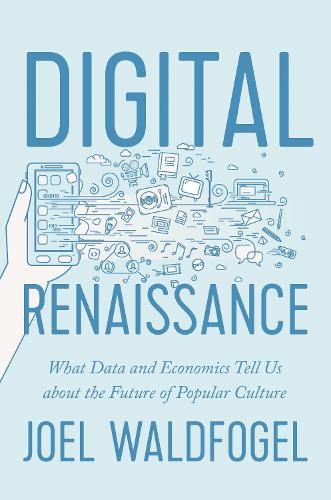
Digital Renaissance: What Data and Economics Tell Us about the Future of Popular Culture
(Hardback)
Available Formats
Publishing Details
Digital Renaissance: What Data and Economics Tell Us about the Future of Popular Culture
By (Author) Joel Waldfogel
Princeton University Press
Princeton University Press
21st January 2019
United States
Classifications
General
Non Fiction
Media, entertainment, information and communication industries
Business innovation
Business competition
Ownership and organization of enterprises
Entrepreneurship / Start-ups
384
Physical Properties
Hardback
320
Width 155mm, Height 235mm
Description
How digital technology is upending the traditional creative industries-and why that might be a good thing The digital revolution poses a mortal threat to the major creative industries-music, publishing, television, and the movies. The ease with which digital files can be copied and distributed has unleashed a wave of piracy with disastrous effects on revenue. Cheap, easy self-publishing is eroding the position of these gatekeepers and guardians of culture. Does this revolution herald the collapse of culture, as some commentators claim Far from it. In Digital Renaissance, Joel Waldfogel argues that digital technology is enabling a new golden age of popular culture, a veritable digital renaissance. By reducing the costs of production, distribution, and promotion, digital technology is democratizing access to the cultural marketplace. More books, songs, television shows, and movies are being produced than ever before. Nor does this mean a tidal wave of derivative, poorly produced kitsch; analyzing decades of production and sales data, as well as bestseller and best-of lists, Waldfogel finds that the new digital model is just as successful at producing high-quality, successful work as the old industry model, and in many cases more so. The vaunted gatekeeper role of the creative industries proves to have been largely mythical. The high costs of production have stifled creativity in industries that require ever-bigger blockbusters to cover the losses on ever-more-expensive failures. Are we drowning in a tide of cultural silt, or living in a golden age for culture The answers in Digital Renaissance may surprise you.
Reviews
"Digital Renaissance should be consulted by any regulator or legislator being solicited by a forlorn media mogul looking to protect a traditional business from disruptive market forces."---Jonathan A. Knee, New York Times DealBook
"The title of his compelling new bookDigital Renaissancebetrays his optimistic thesis, which he backs up with some creative data-sleuthing. . . . Waldfogels book offers reassurance to those who fear that the new regime of ones and zeros is undermining cultural production. But his assessment will be far less comforting to denizens of the traditional cultural-industrial complex, not to mention the cultural pessimists bewailing its decline. . . . The big winners in this renaissance, aside from Amazon, Apple, Netflix, and similar platforms, appear to be the outsiders who couldnt get past the gatekeepers of old, and consumers of culture, who get much more for less."---Daniel Akst, Strategy+Business
"The internet . . . has given consumers around the world access to an unimaginable trove of music, movies, television shows and books, all at the touch of a button. But it sometimes seems as if the deluge is watering down popular culture. . . . Joel Waldfogel begs to disagree. In Digital Renaissance, he argues that we not only have more reading, viewing and listening material than ever before, but its better. And hes got data to back that up. Boy does he have data."---Amanda Gomez, Reuters
Author Bio
Joel Waldfogel holds the Frederick R. Kappel Chair at the University of Minnesotas Carlson School of Management. His previous books include Scroogenomics: Why You Shouldnt Buy Presents for the Holidays (Princeton). He lives in Minneapolis.
